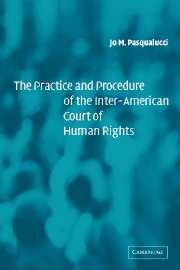Book contents
- Frontmatter
- Contents
- Foreword
- Preface
- Acknowledgments
- Table of cases
- Table of Articles of the American Convention on Human Rights
- Table of 2001 Rules of Procedure of the Inter-American Court on Human Rights
- Table of 2001 Rules of Procedure of the Inter-American Commission on Human Rights
- Table of other legal instruments and documents
- 1 Introduction
- PART I The advisory jurisdiction of the Inter-American Court
- PART II The contentious jurisdiction of the Inter-American Court of Human Rights
- 3 Preliminary objections: legitimate issues and illegitimate tactics
- 4 Proceedings on the merits: fact-finding and attribution of State responsibility
- 5 Victim reparations
- PART III Provisional measures
- Appendix 1 American Convention on Human Rights
- Appendix 2 Rules of Procedure of the Inter-American Court of Human Rights
- Appendix 3 Statute of the Inter-American Court of Human Rights
- Appendix 4 Rules of Procedure of the Inter-American Commission on Human Rights
- Appendix 5 Form for presenting petitions on human rights violations
- Bibliography
- Index
4 - Proceedings on the merits: fact-finding and attribution of State responsibility
Published online by Cambridge University Press: 28 July 2009
- Frontmatter
- Contents
- Foreword
- Preface
- Acknowledgments
- Table of cases
- Table of Articles of the American Convention on Human Rights
- Table of 2001 Rules of Procedure of the Inter-American Court on Human Rights
- Table of 2001 Rules of Procedure of the Inter-American Commission on Human Rights
- Table of other legal instruments and documents
- 1 Introduction
- PART I The advisory jurisdiction of the Inter-American Court
- PART II The contentious jurisdiction of the Inter-American Court of Human Rights
- 3 Preliminary objections: legitimate issues and illegitimate tactics
- 4 Proceedings on the merits: fact-finding and attribution of State responsibility
- 5 Victim reparations
- PART III Provisional measures
- Appendix 1 American Convention on Human Rights
- Appendix 2 Rules of Procedure of the Inter-American Court of Human Rights
- Appendix 3 Statute of the Inter-American Court of Human Rights
- Appendix 4 Rules of Procedure of the Inter-American Commission on Human Rights
- Appendix 5 Form for presenting petitions on human rights violations
- Bibliography
- Index
Summary
The importance and transcendence of the evidence in a jurisdictional proceeding is obvious. It has even been said that the proceeding constitutes, in essence, a broad probative opportunity directed at verifying the de facto conditions that support the legal claims. The juridical consequences are constructed on the basis of the facts. Consequently, the judge must give special attention to the issue of the evidence before beginning the juridical consideration, and, particularly, do so in a firm and reasonably certain way, so that justice may be done in the specific case.
Introduction
If the case is not dismissed in the preliminary objections stage of the proceedings, the Court will consider the merits of the case. During the merits phase, the Court engages in fact-finding and determines whether the State is responsible for the alleged violation. The function of fact-finding in the judicial process is ‘to enable the tribunal to discover the truth concerning the conflicting claims of the parties before it’. In doing so, the judges must evaluate the evidence presented to the tribunal.
Cases before international tribunals are generally heard by judges who were trained in different legal traditions. The two primary legal systems are civil and common law. The integration of these systems is most obvious in the area of fact-finding, where the evidentiary practices between the civil and common law systems differ in significant respects. Under common law, the parties are adversaries who bear the initiative in presenting evidence.
- Type
- Chapter
- Information
- Publisher: Cambridge University PressPrint publication year: 2003



